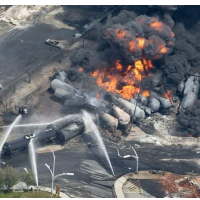Lawsuit Filed to Block Giant Bakersfield Crude-by-Rail Facility
 Lac-Mégantic, Quebec, oil tanker explosion July 6, 2013 (photo: Paul Chiasson, Canadian Press/Associated Press)
Lac-Mégantic, Quebec, oil tanker explosion July 6, 2013 (photo: Paul Chiasson, Canadian Press/Associated Press)
The Association of Irritated Residents is, unsurprisingly, feeling a bit prickly these days.
The unincorporated association of San Joaquin Valley residents, which advocates for clean air and environmental health in one of the state’s poorest areas, is suing (along with two other groups) the Kern County Board of Supervisors over its September approval of a refinery expansion to accommodate oil by rail.
Alon USA wants to re-animate its shuttered Bakersfield complex and transform it into a massive facility for accepting and refining controversial shipments of oil by rail—instead of conventional pipeline or tanker delivery. It would be twice the size of Valero Refining Co.’s proposed Benicia expansion.
The lawsuit (pdf), filed by Earthjustice on behalf of the Irritated, Sierra Club and the Center for Biological Diversity, alleges the county’s environmental impact report (EIR) severely underestimated the danger from air pollution and catastrophic train derailments.
The Alon Bakersfield Refinery Crude Flexibility Project would bring 200 tanker cars a day to the facility, where it would process 70,000 barrels of oil daily. The lawsuit anticipates that oil would come from the fracked Bakken fields of North Dakota, whose product is considerably more flammable than conventional crude, and the tar sands of Alberta, Canada, which produces the dirtiest petroleum product on the face of the Earth.
The project would bring the crude in two mile-long trains “over treacherous and poorly maintained mountain passages, and past Bakersfield High School, without adequate federal and state regulation to ensure the safety of crude by rail transport,” the lawsuit claims. The suit wastes no time referencing the July 2013 tanker train derailment in Lac-Mégantic, Quebec, that killed 47 people.
The lawsuit says the EIR should have compared the coming change in environmental impact to 2008, after the refinery ceased functioning, not 2007, when it still handled crude: “The EIR further hides the impacts of the Project by severely underestimating air emissions, rail transport impacts, hazardous material release risks, and greenhouse gas emissions.” It also accuses the authors of bad math, resulting in wildly inaccurate projects of risk.
“Kern County supervisors broke the law by rushing to approve a project that will pollute the Central Valley’s air and put thousands of unsuspecting people in the path of these hazardous bomb trains,” Kassie Siegel, senior counsel for the Center for Biological Diversity, wrote on their website.
California and federal officials are playing catch up as oil and rail companies ramp up delivery of crude by rail to take advantage of oil extraction techniques, like fracking and acidification, to exploit resources once thought beyond reach. Railroads are carrying 25 times more crude oil nationally than they were five years ago and the increase is reflected in oil spill incidents.
California lawmakers have only recently passed legislation to begin the process of inspecting the 5,000-7,000 privately-owned railroad bridges, some 100 years old, and set up safety plans to handle the inevitable incidents. The companies have been resistent to cooperation with the state on any level, deeming the transportation of dangerous materials across state borders to be almost solely under the perview of the federal government.
Railroads filed a lawsuit in the U.S. District Court for Eastern California last week to block implementation of Senate Bill 861, which was aimed at safety issues. Railroads would have to participate in a state program that plans for oil-spill threats to surface water from pipelines, oil wells, tanker ships and them.
It finances a beefed-up safety program with fees on oil companies and requires railroads to have disaster response plans that pass muster with the state. The law also expands coordination between local, state and federal governments.
–Ken Broder
To Learn More:
Greens Fight SoCal Tar Sands Oil Project (by Rebekah Kearn, Courthouse News Service)
Environmentalists Sue to Stop Kern County Crude Oil Project (by Tony Bizjak, Sacramento Bee)
Railroads Sue over Tepid California Crude-by-Rail Rules They Say Are Too Hot (by Ken Broder, AllGov California)
Lawsuit Challenges Alon Refinery’s Plan to Open Floodgate of Bakken Crude into California’s Central Valley (Earthjustice)
Lawsuit Challenges Alon Refinery's Plan to Open Floodgate of Bakken Crude Into California's Central Valley (Center for Biological Diversity)
Association of Irritated Residents, Center for Biological Diversity, and Sierra Club v. Kern County Board of Supervisors and Kern County Planning and Community Development Department (Kern County Superior Court) (pdf)
- Top Stories
- Controversies
- Where is the Money Going?
- California and the Nation
- Appointments and Resignations
- Unusual News
- Latest News
- California Forbids U.S. Immigration Agents from Pretending to be Police
- California Lawmakers Urged to Strip “Self-Dealing” Tax Board of Its Duties
- Big Oil’s Grip on California
- Santa Cruz Police See Homeland Security Betrayal in Use of Gang Roundup as Cover for Immigration Raid
- Oil Companies Face Deadline to Stop Polluting California Groundwater





